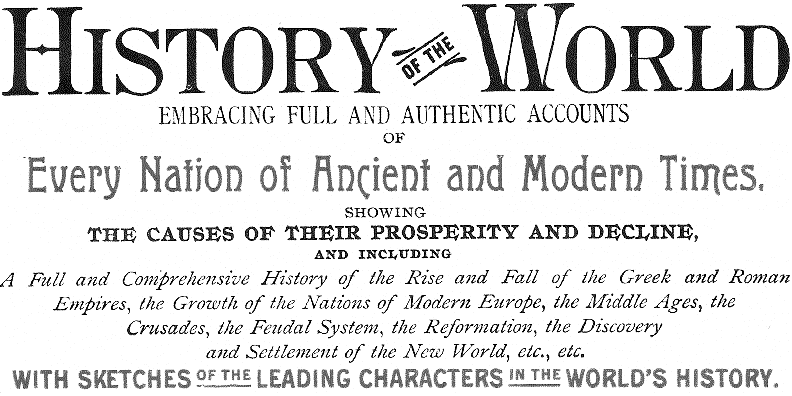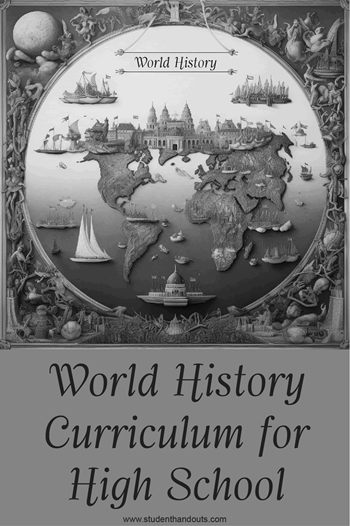 |
|---|
| www.studenthandouts.com ↣ World History |
| World History Units in Chronological Order |
|---|
| Early Humans - Early Hominids - Paleolithic Era - Concept of Time - Hunter-Gatherers - Great Rift Valley |
| Neolithic Revolution - Farming - Agriculture - Domestication of Animals - First Cities |
| Ancient Near East - Assyrians - Babylonians - Lydians - River Valleys - Invention of Money |
| Ancient Egypt - Old Kingdom - New Kingdom - Pyramids - Egyptian Gods and Goddesses - Pyramids |
| Ancient Israel - Ancient Hebrews - Israelites - Israel - Palestine - Jerusalem - Maccabees - Temple |
| World Religions - Buddhism - Christianity - Hinduism - Judaism - Islam - Shintoism - Shamanism |
| Ancient India - Harappa - Indus River Valley - Mohenjo-Daro |
| Ancient East Asia - Ancient China - Ancient Japan - Tang Dynasty - Song Dynasty - Chinese Writing - Korea |
| Ancient Greece - Parthenon - Peloponnesian War - Sparta - Athens - Pythagoras - Archimedes - Solon |
| Ancient Rome - Latins - Seven Hills - Punic Wars - Julius Caesar - Augustus - Marc Antony - Engineering |
| Barbarian Migrations - Invasions of Rome - Goths - Huns - Burgundians - Attila the Hun - Germanic Tribes |
| Byzantine Empire - Law Code - Justinian - Theodora - Eastern Orthodox Church - Eastern Roman Empire |
| Early Russia - Kievan Rus - Muscovy - Cyrillic Alphabet |
| Middle Ages - Dark Ages - Feudalism - Medieval Europe - Lords - Vassals - Peasants - Monasticism - Knights |
| Spread of Islam - Mohammed - Koran - Caliphate - Sunni - Shi'ite |
| Crusades - Kingdom of Jerusalem - Knights Templar - Saladin - Charles Martel - Richard the Lion Heart |
| Edo Japan - Samurai - Bushido - Emperor - Isolation - Tokugawa period |
| Mongols - Genghis Khan - Tartar Yoke - Mongolian Horde |
| Global Trade - Portugal - Italian City-States - Trading Posts - Caravels |
| African Civilizations - Gold - Salt - Native Religions - Culture - Arab Traders |
| Black Plague - Bubonic Plague - Devastation - Population Decimated - Black Death - Peasant Revolts |
| Renaissance - Da Vinci - Michelangelo - Rebirth of Learning - Vernacular Writing - Printing Press |
| Protestant Reformation - Martin Luther - Catholic Reformation - Calvinism - Predestination - Henry VIII |
| Rise of Nation-States - Elizabeth I - Joan of Arc - Rise of Nation-States in Europe |
| Ottoman Empire - Expansion - Decline - Constantinople - Ottoman Turks - Sultans - Islam |
| Ming China - Culture - Growth - Contributions - Ancient China - Ming Dynasty |
| Age of Exploration - Vasco De Gama - Portugal - Spain - Reconquista - Ferdinand and Isabella |
| Mesoamerican Civilizations - Aztec - Ancient Mexico - Inca - Peru - Maya - Central America - Caribbean |
| Columbian Exchange - Christopher Columbus - Hernan Cortes - Francisco Pizarro - Conquest - Disease |
| Global Absolutism - Absolute Monachy - Louis XIV - Divine Right of Kings |
| English Parliamentary Democracy - Magna Carta - Parliament - Glorious Revolution - Puritan Revolution |
| Scientific Revolution - Galileo - Bacon - Descartes - Copernicus - Newton - Scientific Method |
| Enlightenment - John Locke - Voltaire - Social Contract - Philosophes - Voltaire - Diderot - Rousseau |
| French Revolution - Marie Antoinette - Guillotine - National Assembly - Robespierre - de Gouges - Danton |
| Napoleonic Era - Napoleon Bonaparte - Legion of Honor - Spread of Revolutionary Ideals |
| Latin American Revolutions - Simon Bolivar - Mexico - South America |
| Age of Reaction - Concert of Europe - Metternich - Congress of Vienna - Legitimacy |
| Revolutions of 1848 - Paris Commune - Karl Marx - Friedrich Engels - Communist Manifesto - Anarchism |
| Independent Latin America - Benito Juarez - Populism - Cash Crops |
| Global Nationalism - Greek Independence - Italian Unification - Romantic Period - Classical Music |
| Industrial Revolution - Factory System - Growth of Cities - Democratic Reforms - Birth of Unions - Karl Marx |
| Imperialism - British Empire - Berlin Conference - Scramble for Africa - Indochina - Opium Wars |
| La Belle Époque - 1871-1914 - Beautiful Era - Pax Britannica - Wilhelminism |
| Meiji Restoration - Modernization of Japan - Militarization - Japanese Empire |
| World War I - Trenches - Mustard Gas - Modern Warfare |
| Russian Revolution - Vladimir Lenin - Joseph Stalin - Communism - Collectivization |
| Rise of Fascism - Great Depression - Benito Mussolini - Spanish Civil War - Francisco Franco - Adolf Hitler |
| World War II - Adolf Hitler - Holocaust - Manhattan Project - Pearl Harbor - Kamikaze - Churchill |
| Cold War - Detente - Domino Theory - Korean War |
| United Nations - Establishment - Structure - Goals - Purpose - Leadership |
| Postwar Economics - Marshall Plan - Green Revolution |
| Chinese Revolution - Sun Yat-sen - Mao Zedong - Cultural Revolution - Taiwan |
| Collapse of Imperialism - Vietnam War - Independence in Africa - British Commonwealth |
| Modern Africa - Apartheid - Rwandan Genocide - HIV/AIDS Epidemic - Ebola - Demographic Changes |
| Middle East Conflict - Establishment of Israel - Oil - Arab-Israeli War - Ayatollah Khomeini - Saddam Hussein |
| Collapse of Communism - Soviet Union - Mikhail Gorbachev - Boris Yeltsin - Glasnost - Berlin Wall - Bosnia |
| Globalization - European Union - Multinational Corporations - G8 (Group of Eight) - NATO |
| Modern Latin America - Juan Peron - Sandinistas - Noriega - Iran-Contra Affair - Drug Cartels |
| Modern Global Issues - Global Migration - Climate Change - Greenhouse Effect - Carbon Emissions |
| Modern Technology - Space Race - Internet - Bioengineering - Computer Security - Information Age |
World history is a vital field of study for high school students that examines the collective human experience across time and space. It encompasses the stories of civilizations, cultures, individuals, and events that have shaped our global society. The importance of world history can be understood from various perspectives, including its role in fostering a global perspective, promoting cultural understanding, informing decision-making, and offering valuable lessons for the future. Our free world history curriculum strives to bring junior and senior high school students face-to-face with the events, people, and places of our past. Fostering a Global Perspective: World history broadens our horizons by exposing us to diverse peoples, places, and time periods. It encourages us to view the world from a global perspective rather than a narrow, nationalistic one. This expanded view is crucial in our interconnected world, where events in one region can have far-reaching consequences globally. Understanding the interconnectedness of history helps us appreciate the complexities of contemporary global issues, such as climate change, international conflicts, and economic globalization.
Fostering a Global Perspective: World history broadens our horizons by exposing us to diverse peoples, places, and time periods. It encourages us to view the world from a global perspective rather than a narrow, nationalistic one. This expanded view is crucial in our interconnected world, where events in one region can have far-reaching consequences globally. Understanding the interconnectedness of history helps us appreciate the complexities of contemporary global issues, such as climate change, international conflicts, and economic globalization.Promoting Cultural Understanding: World history facilitates cultural understanding and empathy by exploring the rich tapestry of human civilizations. It exposes us to the values, beliefs, traditions, and art forms of different cultures, fostering respect for cultural diversity. This understanding is essential for peaceful coexistence in a world characterized by cultural pluralism and globalization. It also helps combat stereotypes, prejudice, and ethnocentrism. Informing Decision-Making: Knowledge of world history equips individuals and societies to make informed decisions. Understanding historical patterns and precedents can help policymakers, diplomats, and citizens navigate complex issues, make strategic choices, and avoid repeating past mistakes. History provides insights into the consequences of various policies, ideologies, and actions, enabling us to shape a better future. Lessons for the Future: History serves as a repository of valuable lessons. By studying the successes and failures of past societies, we gain insights into the dynamics of governance, economics, social movements, and technological advancements. These insights can inform our efforts to address contemporary challenges, such as poverty, inequality, and political instability. History also teaches us about resilience, adaptability, and the capacity for positive change. Preserving Cultural Heritage: World history plays a crucial role in preserving cultural heritage. It helps us recognize the significance of historical landmarks, artifacts, and sites. Understanding the historical context of cultural treasures allows us to appreciate their importance and protect them for future generations. Inspiration and Identity: Learning about the accomplishments of individuals and societies in the past can inspire us to achieve great things in our own lives. Historical figures who have overcome adversity, advanced human knowledge, or championed social justice serve as role models. Moreover, history provides a sense of identity and belonging, connecting us to the narratives of our ancestors and the legacies they left behind. Promoting Critical Thinking: Studying world history cultivates critical thinking skills. It encourages us to analyze sources, question assumptions, assess evidence, and construct well-reasoned arguments. These skills are invaluable in a world flooded with information, disinformation, and complex issues. Cultivating Civic Engagement: An understanding of world history is essential for informed and engaged citizenship. It encourages active participation in democratic processes, civic debates, and social advocacy. An informed citizenry is better equipped to hold governments accountable and advocate for positive change. World history is of paramount importance for its ability to broaden perspectives, promote cultural understanding, inform decision-making, offer valuable lessons, preserve cultural heritage, inspire individuals and societies, cultivate critical thinking, and foster civic engagement. It provides us with a profound sense of context, allowing us to better navigate the challenges and opportunities of our rapidly evolving world. By studying world history, we not only honor the past but also prepare ourselves for the complexities of the future. Our free world history curriculum makes these goals a reality. |
| www.studenthandouts.com ↣ World History |








